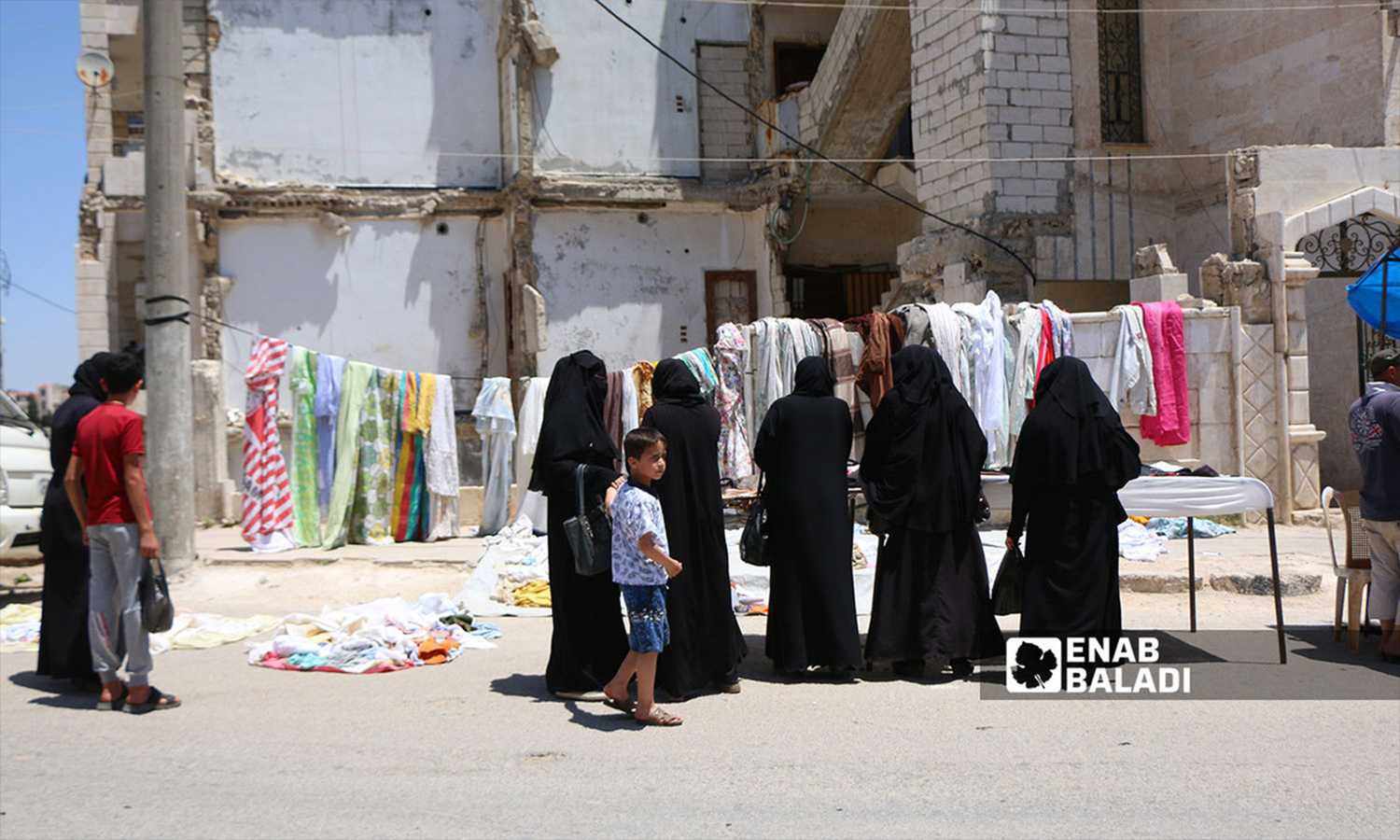



Enab Baladi – Idlib
The 47-year-old Hammoud Abduldayem is disappointed with the loss of his source of livelihood after the local authorities removed all the stands from the sidewalks in the northern city of Idlib.
“I had a stand in the goldsmith’s market in Idlib city, it was the only source of livelihood for me and my family,” he says.
On 10 May, the Ministry of Local Administration and Services in the Syrian Salvation Government (SSG) issued a decision requiring the owners of stands and stalls within the city to remove trespasses and violations from streets and sidewalks in order to ensure the movement of citizens and cars.
The Idlib city council of the Ministry of Local Administration at the time set 21 May as a deadline for implementing the decision, under penalty of legal accountability, and taking all measures, including confiscation and seizure.
The decision issued by the Idlib city council “is unfair to me and to hundreds of vendors,” according to what Abduldayem considered, “we are in favor of beautifying and organizing streets and roads, but not at the expense of people’s livelihood.”
The owners of the stalls in the northwestern city are calling for the beautification of Idlib as part of a methodology that preserves their only source of livelihood and not for the organizational processes to worsen their living situation.
“Before issuing this decision, the council had to work on securing a temporary or permanent alternative or a temporary investment project, providing those affected by the decision an alternative source of income,” Abduldayem said.
He added, “The council’s decision needs to be re-examined to come up with temporary or permanent solutions, noting that there are many squares in the city of Idlib where work can be done.
The stall owner asks, “Where will we go now after removing the stands and stalls? We used to work every day to live, no more, no less.”
The ‘small merchants’ affected by the decision submitted proposals to the local council to allocate trade areas for them in the city, urging the council to take pity on their condition after their livelihoods were cut off.
“The owners of the stands are living in a ‘state of war’ because many families suffer poverty and lack of material income, and we only have this space for us to work,” Mohammed Mustafa, 51, told Enab Baladi about his situation.
The area of one stand is one meter in width and one meter in length, and “when a car comes and stops in the place of the stand, it takes an area of four meters by two meters, which is equivalent to three times the area of one stand,” says Mustafa, the IDP from Maarat al-Numan town.
“Most of the people who own stalls are displaced people. They work for the price of a bundle of bread and nothing more,” he added.
At the beginning of the year, the Idlib city council began a campaign to remove the stalls and stands from the city’s streets and to establish alternative markets, which created resentment among the stall owners.
The decision to remove violations from sidewalks and public roads came to facilitate movement for citizens and cars, provided that alternatives are secured through the opening of popular mobile markets (bazaars) in different places in the city of Idlib during weekdays, according to what the city council said.
In an opinion poll conducted by Enab Baladi, the owners of stands said that the site of stands is fixed and known, and it is easier for customers to reach, while the bazaars will be mobile, and their locations in the neighborhoods will be unknown and at specific times only.
The local council in Idlib, in cooperation with the region’s administration, the Ministry of Interior, and the Ministry of Development, continues to work to remove trespasses and violations on the sidewalks in the city’s streets, Firas Alloush, the director of public relations in the Idlib city council, told Enab Baladi.
The measure was in response to many complaints by citizens about their inability to walk and move on the sidewalks, pointing out that the occupancy of the sidewalks is considered a violation, and it is not permissible and is not allowed in any city in the world, says Alloush.
“The council worked to secure an alternative for the stall owners, as we secured daily bazaars in the various neighborhoods of Idlib city, where the stall owners can practice their work on a daily basis and earn their livelihood.”
Alloush added that the work of the stand owners in the bazaars located in the different neighborhoods would increase their income because these bazaars are more crowded than the streets where stands were spread.
As for the alternative markets for stalls, the director of relations in the city council said, “We are currently working, after building the al-Hussein Square market in one of the city’s neighborhoods, to beautify and expand it and to secure resting places for customers who flock to this market.”
A report by the United Nations Office for the Coordination of Humanitarian Affairs (OCHA) on 20 April documented the increased need to support northwestern Syria.
According to the report, one-fifth of the displaced people in northern Aleppo and about 28 percent in Idlib governorate live critically under the minimum expenditure basket for survival in terms of basic food and non-food items.
The number of Syrians in need of humanitarian assistance reached about 14,600,000 people, after it was 13,400,000 during 2021, according to the UN report issued on 23 February.
On 12 January, the Secretary-General of the United Nations, Antonio Guterres, presented a report confirming that 90 percent of Syrians are below the poverty line, while 60 percent of them suffer from “food insecurity.”
if you think the article contain wrong information or you have additional details Send Correction